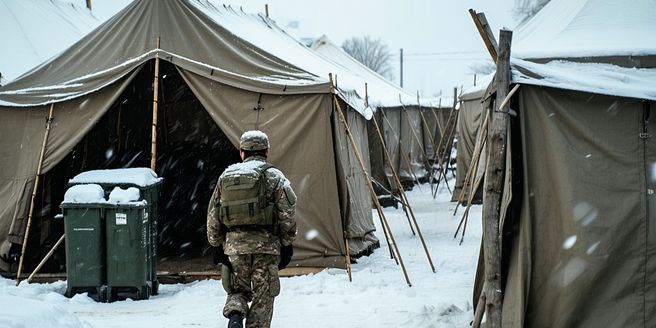
Impact of Harsh Winters on Military Strategy
Harsh winters have long endeavored as pivotal elements in the strategy of war. For Napoleon’s campaign in Russia, the unforgiving cold weather magnified logistical challenges and troop hardships. When armies faced freezing temperatures, their mobility became constrained, their morale faltered, and their overall capacity to wage war diminished. Historical military defeats, such as Napoleon’s, underscore the critical necessity for strategic adaptations to climatological conditions. The stark cold, relentless snow, and icy winds effectively halted progress and turned soldiers into casualties, emphasizing the importance of weather-resilient strategies in warfare. Preparation for such extremities could alter the fate of an entire campaign, illustrating the significant impact of climate on military planning, operations, and outcomes. Thus, severe winters present not just a background element but an active, formidable adversary in military engagements.
The Role of Weather in Supply Chain Disruptions
Weather conditions significantly impact supply chain logistics, especially in military contexts. During Napoleon’s Russian campaign, the severe winter weather disrupted the supply routes that were crucial for sustaining his Grande Armée. Snow-blocked roads, ice-clogged rivers, and treacherous pathways impeded the delivery of essential goods such as food, ammunition, and medical supplies. This not only caused logistical failures but also contributed to the starvation and weakening of troops. The foundation of a reliable military supply chain must incorporate contingency plans for adverse weather, including alternative pathways, robust storage solutions, and preemptive resource allocation. In modern contexts, businesses and militaries must develop resilience strategies to mitigate weather-related disruptions, demonstrating the broader, enduring importance of weather considerations in supply chain management.
How Weather Affected Napoleon’s Troop Morale
Napoleon’s campaign into Russia was not merely a logistical and strategic challenge but an extreme test of troop morale. The fierce Russian winter imposed severe physical and psychological tolls on soldiers, drastically affecting their fighting spirit. As supplies dwindled amid the biting cold, hunger and frostbite became rampant, leading to despair and diminished combat effectiveness. The relentless harshness of the climate sapped the soldiers’ willpower, creating a sense of hopelessness and inevitability. Morale plummeted as the realities of facing both an enemy and a brutal environment set in. Commanders struggled to maintain order and motivation. The attrition of morale during this campaign illustrates the critical importance of weather preparedness, not only logistically but also in terms of maintaining a tenacious and resilient spirit among troops when faced with environmental adversity.
Comparing Russian and French Preparedness for Winter
The comparison of Russian and French preparedness during the harsh winter of the 1812 campaign reveals stark differences. The Russians, familiar with their winters, demonstrated superior readiness, employing strategies that leveraged the environment to their advantage. They executed scorched-earth tactics, leaving the French without supplies from the land. Their troops were better equipped and acclimatized to the cold. Meanwhile, the French, led by Napoleon, were caught ill-prepared, their troops clad inadequately and lacking sufficient winter provisions. The disparity in preparation accentuated the harsh impacts of the weather on the French forces, which suffered immense losses from exposure and supply deprivation. This contrast underscores the strategic advantage gained through understanding and preparing for local climatic conditions, which became a decisive factor in the conflict’s ultimate outcome.
Weather-Driven Tactical Errors in the Campaign
The Russian campaign saw several weather-driven tactical errors that contributed to Napoleon’s downfall. Unfamiliar with the harsh Russian climate, French forces underestimated the severity of winter, leading to logistical missteps. Poor weather reconnaissance and an overreliance on traditional tactics ignored the environment’s challenges. The frozen landscape made flanking maneuvers difficult, while icy conditions limited cavalry effectiveness. Additionally, the timing of campaigns failed to account for seasonal changes, resulting in troops being stranded during extreme weather. Forced marches under freezing conditions weakened the men, leaving them vulnerable to attacks. These miscalculations highlight the critical need for weather-informed tactics, where environmental conditions are integrated into operational planning. Failure to do so can lead to catastrophic outcomes, as illustrated by the French experience during their ill-fated Russian campaign.
Long-term Consequences of Weather Factors
The long-term consequences of weather factors in Napoleon’s Russian campaign were profound. The severe winter not only decimated his army but also had longstanding geopolitical impacts. Napoleon’s failure marked the beginning of his empire’s decline, shifting the balance of power in Europe. The campaign’s outcome demonstrated the devastating potential of environmental factors in military strategy, influencing future military doctrines to account for climatic challenges. These events emphasized the importance of environmental intelligence in planning military operations. Moreover, the catastrophic losses reshaped the political landscape, weakening French hegemony and altering alliances. This legacy extends into contemporary strategic planning, where the integration of comprehensive environmental assessments remains essential for effective decision-making in military and civilian contexts. Weather’s relentless influence on human endeavors remains a potent reminder of nature’s ultimate dominion over warfare outcomes.
